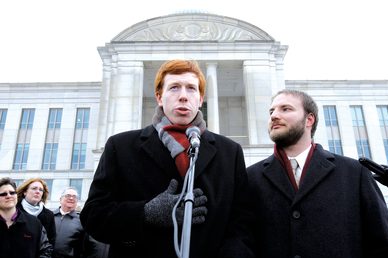The seven justices of the Iowa Supreme Court heard arguments last week in a challenge to the state’s ban on same-sex marriage.
The case came before the state Supreme Court after Superior Court Judge Robert B. Hanson ruled in August 2007 that the state’s refusal to issue marriage licenses to same-sex couples was unconstitutional.
After having been denied marriage licenses, six same-sex Iowan couples, backed by national LGBT group Lambda Legal, filed suit in 2005. The couples argued that the state’s 1998 Defense of Marriage Act — a law that defined a “valid” marriage as being between one male and one female — violated the equal-protection and due-process guarantees afforded to all Iowa residents by the state’s constitution.
Hanson issued a stay on his decision the following day but not before one same-sex couple was granted a marriage license. That couple, Sean and Tim McQuillan, is the only legally married same-sex pair in the state.
The state appealed the decision to the state Supreme Court and during the Dec. 9 hearing, Roger Kuhle, Polk County assistant attorney, argued that “same-sex marriage will harm the institution of marriage as we know it.”
After Kuhle put forth an argument that the main purpose of marriage was always understood to be procreation, which he said cannot be accomplished through the union of same-sex couples, Justice David Wiggins questioned Kuhle on the seeming inflexibility of his definition of marriage.
“Thirty years ago you couldn’t have interracial marriage. I mean things are just changing,” Wiggins said. “Is marriage, as you call it, a static relationship?”
Kuhle argued that same-sex marriage is an issue that the Iowa legislature, not the courts, should address.
The justices also questioned Dennis Johnson, former Iowa Solicitor General and attorney for the couples, on the possible ramifications of legalizing same-sex marriage, mentioning the potential for a push for the legalization of polygamous marriages.
Johnson noted, however, that marriage has always been recognized as the union of just two people; he said his clients were not seeking to overturn the traditional conception of marriage but rather just looking to expand its scope to concur with contemporary society.
“We’re not suggesting a new institution,” Johnson said. “We’re just asking that everybody be able to participate equally in the institution that’s existed since the beginning of this state.”
If the Iowa Supreme Court concurs with Hanson’s decision, Iowa would become the third state in the country, along with Massachusetts and Connecticut, to offer same-sex marriage.
“We put our best case forward and hope that the court breathes life into the Iowa Constitution’s promise of equality,” said Camilla Taylor, Lambda Legal senior staff attorney.
A decision in the case is not expected for at least several months.
Earlier this week, the city council in Sioux City, Iowa, decided to indefinitely suspend action on a resolution that would have formally expressed the council’s opposition to same-sex marriage and called for a statewide vote on the issue. The city’s mayor pressed the council members not to move forward with the resolution until they’d sought the advice of the state’s attorney general on whether the council has the jurisdiction to approve a resolution on such an issue.
Jen Colletta can be reached at [email protected].
